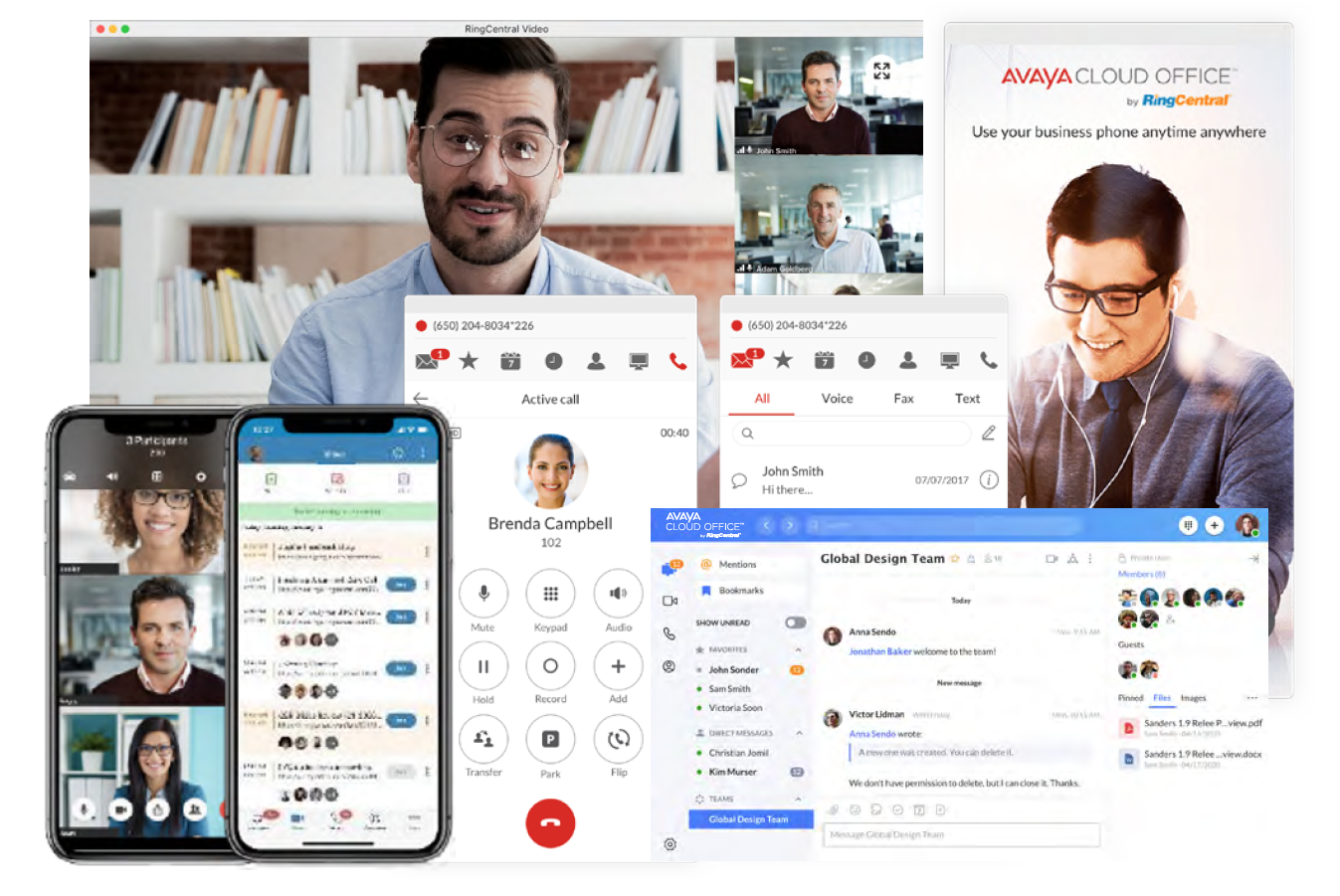Office Phone Systems
Better communication creates better business.
Your Phone System Could Be Doing More with Way Less.
Call, message, meet, and more with AI-powered tools for smarter communication with customers and teams.

Connect from any device, any where
Leave the office with confidence, never missing a call. Your work number is consolidated in one app, installable on any device. Take video calls on the go and respond to customer messages without skipping a beat.

Lower your phone bill
Moving to the cloud means you can use voice, video, and messaging on a unified platform with no upfront expenses on hardware and installation. Plug, play and only pay for your handsets and your lines.

1/3 fewer the lines, 100% efficiency
Cut down on additional phone lines with seamless integrations, and impressive latency.

Effortless expansion, seamless integration
Is your team growing? Set up new users online with ease, and have new phones shipped within days without waiting for an on-site technician every single time. Save on time and service fees.
.png?width=1080&height=1080&name=Untitled%20design%20(25).png)
Get Up and Running in Minutes
Easily add new numbers, devices, offices, and remote teams without interruption.

Complete
Use one number for calls, texts, and faxes, with features that meet every need in your organization.

Deeply Integrated
Leverage pre-built workflow templates, over 400 integrations, plus the richest calling experience in Microsoft Teams.

Advanced Call Routing
With intelligent call routing and advanced call handling, seamlessly manage high call volumes by directing calls to the next available team member within a group.
Keep your business phone system within your business walls or move to the cloud.
What's the difference?
Cloud Phone Systems take the form of software or web applications and work with the help of an internet connection. They don’t have a physical PBX system. Instead, a virtual PBX hosted on the cloud keeps their engine running. There are no upfront costs for your PBX; instead, you pay a monthly recurring subscription.
Cloud phone systems are ideal if you want the best maintenance-free small business VoIP systems and position your system towards the future.
An on-premises VoIP phone system is where the PBX hardware is kept on-site in your server closet. Instead of physically connecting to the PBX with copper wiring, phones connect to the PBX over an office’s Local Area Network (LAN), often leveraging the same Internet connectivity that your office computers do. When you choose an on-premise system, you own all the hardware; it’s yours to buy, sell, upgrade, discard and maintain as you so choose.
On-Premise phone systems are ideal if your business has regulatory requirements that may be difficult to meet in the cloud.
Real Results: Transforming Business Communications
"The system will do a million more things then we will every use it for (old school around here) but it has done what I needed it to do...stop the 50+ calls a day coming into the building that didn't need my attention. I think I have transferred 5 calls to my team all week...I’ve been more productive this week than I have been in 2 years!"
Tanya Majensky | Executive Assistant | Dynamic Towing

How Much Does an Office Phone System Cost?
If you opt for a cloud phone system, you will be charged per line per month.
Regular phone lines range from $20 to $50 per line per month or $240 to $600 per year.
From our experience, you should budget approximately $350 per desktop phone you require, but if you want an advanced or wireless phone, your price could be as much as double for each handset.
Regarding on-premise phone systems, you need to account for the upfront cost of a PBX system. The average PBX system typically costs approximately $4500, depending on the configuration.

Is Your Telecom Carrier Overcharging You?
You’re probably not wrong. According to Gartner, 85% of telecom invoices contain billing errors, often costing businesses an extra 12–20% every month. If you suspect you’re being overcharged or your bandwidth isn’t keeping up, we can help! Our specialists will assess your current carrier services and suggest ways you can save — for free!
-3.png?width=1080&height=1080&name=Untitled%20design%20(4)-3.png)
Choosing the Right Solution (For an Upgrade or a Brand-New Set-Up)
Do the features meet my business needs?
Modern businesses require modern communication tools. Missing critical features like call recording or conferencing can hinder productivity and growth. Key features to look for include call management, mobility and unified communications.
Is it simple to operate?
Not every small business has a dedicated IT team. Your phone system should be easy to set up, manage, and scale as your business grows. Look for user-friendly setup, scalability and remote management.
Does it fit my budget?
Upgrading your phone system might be an excellent decision for your business if you want to reduce your monthly phone bill. After switching from a traditional phone system to a phone system using SIP lines, our customers save upwards of 30%, on average.

Copier & Technology Service That Exceeds Industry Benchmarks & Reaches You Fast
Great service should be measurable, so we measured it. We benchmark our results against industry standards for Canadian copier dealers. Here’s what the data shows.
We know service isn’t just about showing up. It’s about being responsive, solving problems quickly, invoicing accurately, and getting it right the first time. These numbers reflect the experience of our customers. When we say we deliver best-in-class service, it’s because they’ve said it first.
1st Call Effectiveness
Industry Standard: 82%
Avg. Response Time
Industry Standard: 4 hours
Avg. Resolution Time
Industry Standard: 5.2 hours
Frequently Asked Questions About Business Phone Systems
What are the pros of cloud phone systems?
Cost-Effective: Affordable for small to mid-sized businesses with minimal upfront investment.
Scalability: Easily add users and features as the business grows.
Remote Maintenance: Providers handle updates and support, reducing on-site IT needs.
Flexible & Reliable: Adapts to changing business needs with predictable monthly fees.
Minimal Hardware Requirements: No extensive infrastructure needed, simplifying setup and operation.
What are the pros of on-premise phone systems?
Full Control: Businesses can directly manage and customize the system without relying on external providers.
Lower Long-Term Costs: Initial investment may lead to lower total ownership costs over time.
Local Data Storage: Ensures that all communications data is stored securely on-site.
Can I keep my phone number when I switch to a new business phone provider?
Yes, you can typically keep your existing phone number when switching to a new business phone provider. This is done through a process called "number porting," which allows you to transfer your active number from your old provider to the new one. You'll need to check with your new provider to confirm the process, ensure your number is eligible, and provide necessary details like your account number and billing address. It's important not to cancel your existing plan until the porting process is complete, which usually takes 1-2 weeks. If you decide to switch providers again in the future, you can port your number out as well.
Who manages and supports Office Interiors’ phone systems?
Office phone systems are provided, managed, and supported by Cabco Communications, our affiliate company specializing in business communications and IT solutions.
Who is Cabco Communications?
Cabco Communications is Office Interiors’ affiliate company and one of Atlantic Canada’s leading business communications integrators.
Founded in 1980, Cabco specializes in unified communications and is an authorized agent to regional carriers.
Test if a New Phone System is Right for Your Business.
In our years of selling phone systems, we have found only one method that will definitively answer whether an upgrade will deliver a positive ROI for your business. That method? A third-party audit of your phone bill.
Fill in the form on the right to sign up.



